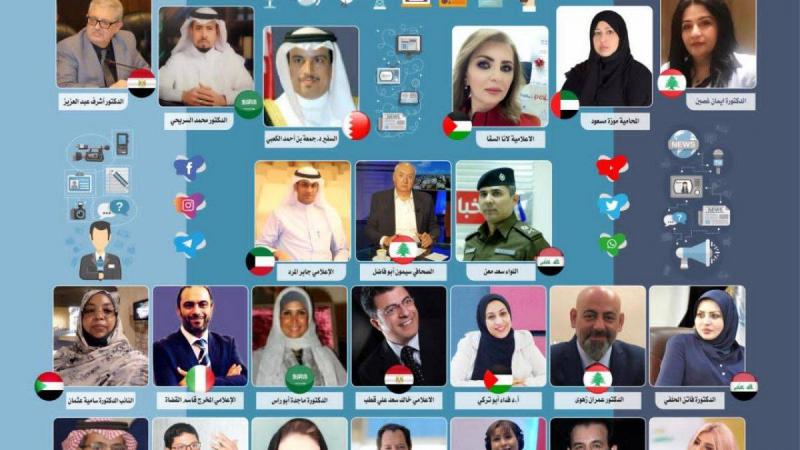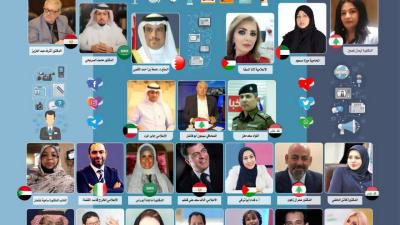The "Arab Women's Development and Business Council in Lebanon" held a virtual meeting via Zoom concerning the role of media in crisis and disaster management.
The National News Agency reported that this forum was organized in collaboration with the Arab Union for Sustainable Development and Environment, the Srhi Committee for Creativity in Saudi Arabia, and the Fujairah Social and Cultural Association. The agency indicated that the forum concluded with several recommendations aimed at preparing media professionals equipped with knowledge, culture, and professional integrity, stressing that the media is one of the most important means of influencing public opinion and beliefs to serve causes and build nations rather than being misused to promote causes that lead to fragmentation and division.
The forum emphasized the media as a fundamental element for marketing and promoting events to reach the audience and to simulate ideology and influence. It called for the establishment of a media council supervised by the Arab Ministers' Council in the Arab League to serve as a community voice addressing societies across the Arab nation and promoting a culture of tolerance and peace through transparent and honest media free from political direction.
The forum recommended that honest media present beneficial topics to the Arab audience by showcasing aspects that contribute to promoting tolerance and peace among individuals and peoples or, conversely, aggravating relations between nations and creating crises through visual or audio media by holding seminars and forums addressing both the Arab and international communities. Additionally, it advocated for supporting modern media in the Arab world through dedicated colleges to promote media culture with quality content, as media today is not just about conveying news but also about how to create news using advanced techniques such as digital media and high-quality content.
The forum continued with recommendations to establish an Arab network focused on enhancing media contributions that build the Arab nation and narrow differences, serving as a bulwark against misinformation that causes division. It highlighted the potential of media as an educational and cultural tool for societies through knowledge-sharing across Arab countries, as experienced during the COVID-19 pandemic.
The forum pointed out the importance of connecting an Arab media center with crisis centers in countries, as media serves as a guiding and directive tool, effectively engaging in social interaction and awareness regarding crisis emergence and management through channels and institutions that contribute to this within society. It also noted the importance of utilizing digital transformation and artificial intelligence in structuring new media, organizing courses and programs across journalism colleges, and forming an Arab media committee to handle crisis and disaster management, facilitating coordination among members and interested parties in member states.
Furthermore, it reaffirmed the Council's fight against media that fuels division between nations by rectifying it and establishing penal laws, differentiating between free media and political media devoid of journalistic integrity.
The forum also suggested that media should act as a standard and measure that monitors the surrounding environment, capturing information to provide to society—something witnessed in our communities during the global pandemic. Honest media dealt with the crisis transparently and reliably, allowing our countries to overcome the crisis, while those that did not handle it with integrity faced adverse consequences.
The forum highlighted that honest media, whether traditional or digital, is vital for instilling a culture of tolerance and peace, which is essential for building trust among individuals and peoples to contribute positively in addressing crises and confronting disasters.
The agency added that participants in the forum included journalists, representatives of Arab civil society organizations, and experts, led by Dr. Ashraf Abdel Aziz, Secretary-General of the Arab Union for Sustainable Development and Environment (Egypt), Dr. Iman Ghssain, President of the Arab Women's Development and Business Council (Lebanon), Dr. Mohammed Srhi, Head of the Srhi Committee for Creativity (Saudi Arabia), Dr. Jumaa bin Ahmed Al-Kaabi, Ambassador of the Kingdom of Bahrain to Oman, and the Chairman of the Scientific Advisory Committee for the Arab Union for Sustainable Energy.
Additionally, the agency noted that Major General Saad Ma'an from the Iraqi Ministry of Interior participated in the forum, presenting an overview of the Iraqi security media experience during the liberation of territory from the terrorist organization "ISIS." Journalist Simon Abou Fadel discussed "The Role of Media in Promoting Civil Peace and Managing Crises and Disasters." Other discussions included Lana Al-Saqaa, Head of the Gender Unit at the Palestinian Broadcasting Authority, who addressed "Portrayals of Women in Palestinian Media," and Khaled Saad Ali from Egyptian Channel One, who spoke on "The Role of Media in Supporting National Security in Egypt and the Arab World."
On "Media and Human Rights Challenges," Dr. Faten Al-Halfi from the High Commission for Human Rights in Iraq and Kuwaiti journalist Jaber Al-Mard discussed "The Role of Women in Volunteer Work During Crises."
Also participating were Fida Abu Turki, Chairwoman of the Irada Organization for Women Entrepreneurs in Palestine, Dr. Alaa Rajab, a mental health consultant and head of the media committee, who covered "The Role of Women in Facing the Corona Pandemic in Arab Society." Journalist Youssef Hossik from Morocco talked about "Media as a Double-Edged Sword," while Mozah Masoud, Executive Director of "Happiness and Positivity" in the Fujairah Social and Cultural Association, discussed "The Role of Media in Managing Crises and Heritage in the UAE."
The discussion also included Dr. Imran Zohwe, a political writer and researcher on "Media's Role in Social and Human Development," Libyan businesswoman Amira Ashouraks on "Empowering Women Economically," and Syrian journalist Waddah Al-Saeed on "Digital Marketing."
The forum tackled the "Social Responsibility of Media in Crisis Management" during a contribution by Tunisian journalist Alifa Woslati, and director Qassem Al-Qadda from Italy discussed "Media Drama and Its Impact on Managing Crises and Disasters," describing them as "two sides of the same coin." The session concluded with Lebanese journalist Abir Obeid Barakat discussing "The Role of Media in Supporting Women in Decision-Making."




